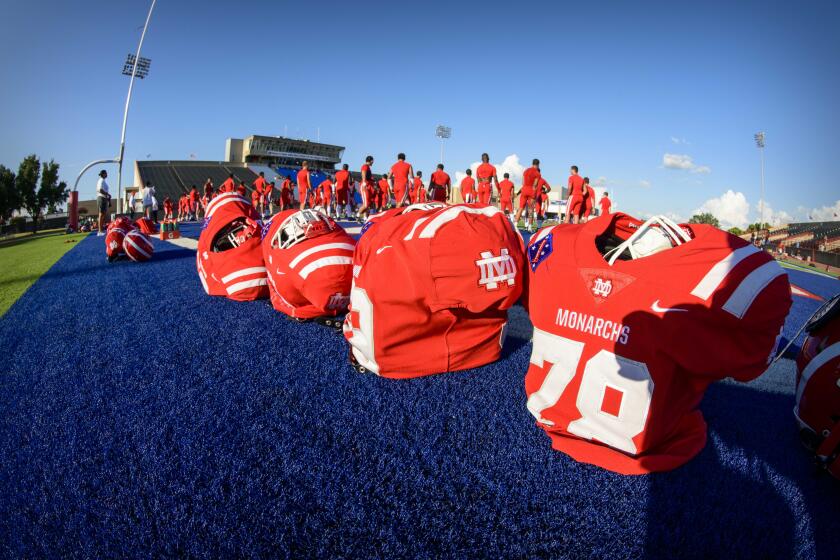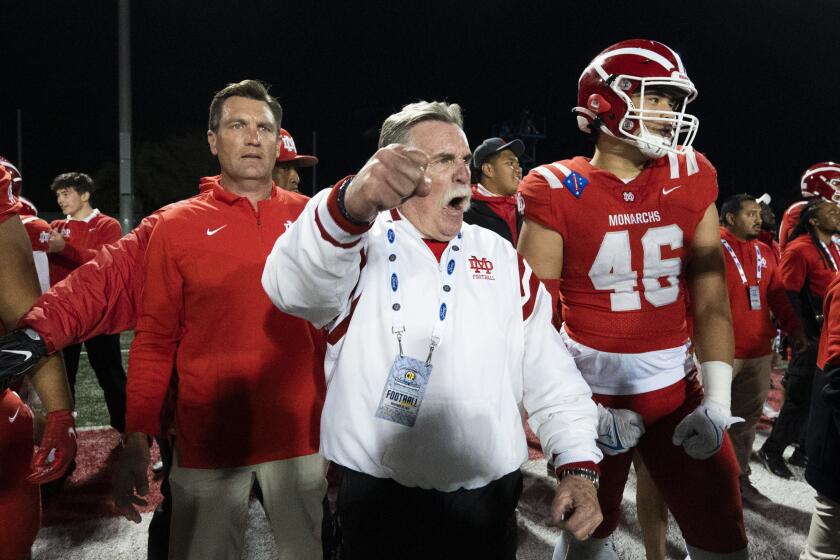Football powerhouse Mater Dei confronts hazing scandal with a wall of silence
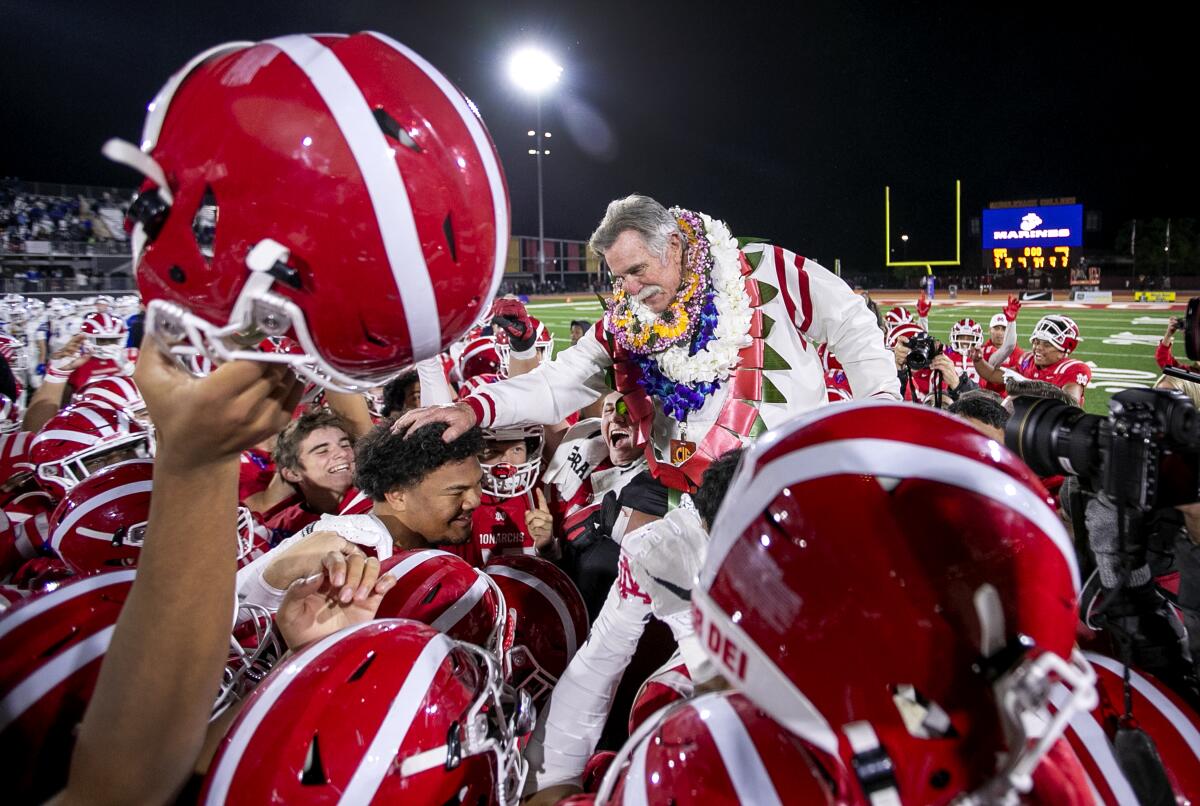
Hoisted upon the shoulders of his players, fresh leis piled high around his neck, Bruce Rollinson looked out upon thousands of faithful fans who had braved 48-degree weather to watch Mater Dei High School win its third state football championship in five years.
A chant â âRollo! Rollo!â â began to echo from the stands.
But rather than stay on the field for postgame interviews with his star players, Rollinson was quickly hustled away by a knot of security guards and assistant coaches when journalists approached him.
The Monarchsâ resounding win on Dec. 11 capped a month of external scrutiny for Rollinson and the schoolâs storied athletic program, following a lawsuit that accuses Mater Dei and the Roman Catholic Diocese of Orange of trying to cover up a brutal locker room altercation that left a player with a traumatic brain injury.
Allegations of scandals at schools often lead to protests by students, petitions circulated by alumni, and other calls for change. Not at Mater Dei, which has one of the nationâs best high school football programs.
Employees, parents, students and the diocese have largely closed ranks. Supporters and employees of the football program, a fundraising powerhouse, have fallen back on a practiced wall of silence.
The school has pledged to review safety protocols within the athletics program, but Rollinson and school administrators have declined interview requests. Orange County Bishop Kevin Vann has issued one public statement, decrying coverage of the lawsuit as a âmedia frenzyâ that is âconcerning and saddening, to say the least.â
The fans, rivals and residents of Orange County who follow the Santa Ana team have split into two entrenched and now-familiar camps: support for a dominant football program that has been unfairly maligned; or deep suspicion that the school and the diocese will tolerate bad behavior to keep winning.
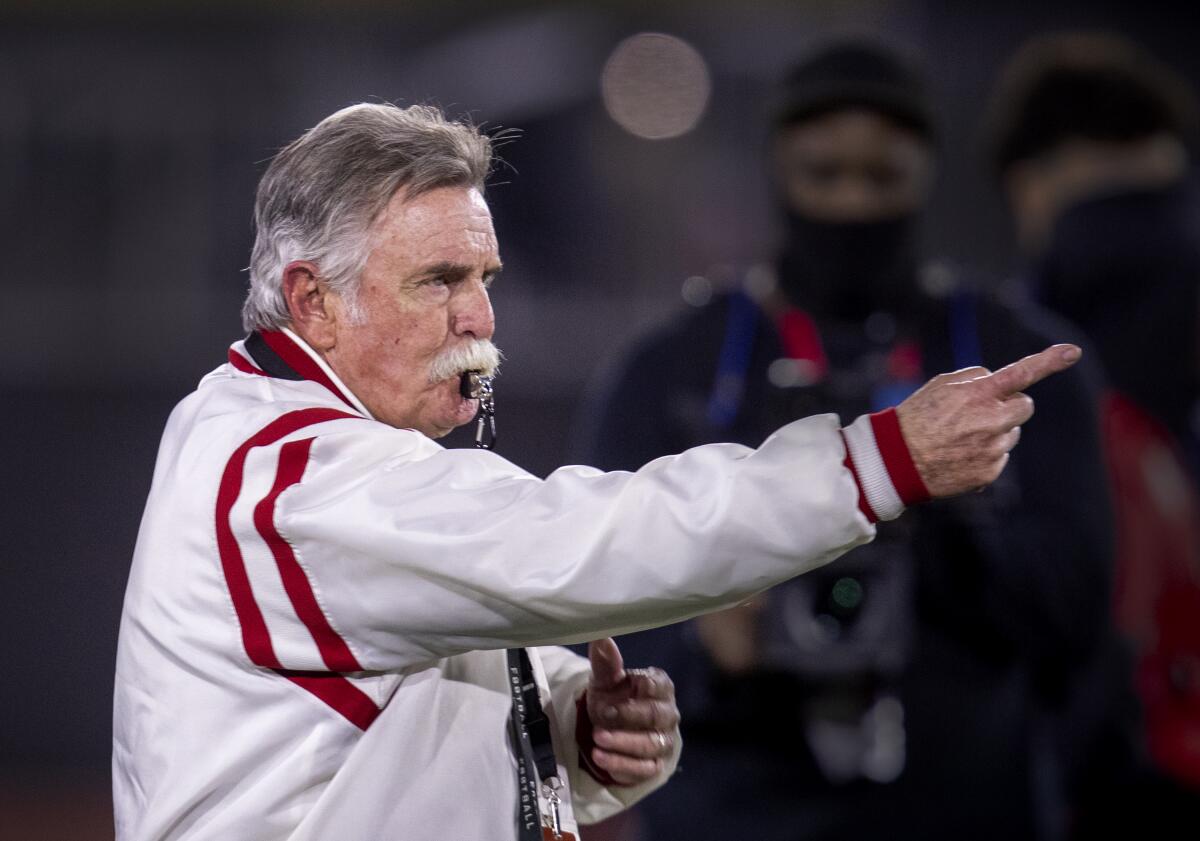
Rollinson is âone of the greatest men to ever walk the planet,â said Steve Daniels, the father of JT Daniels, who led Mater Dei to the 2017 state championship and is now a quarterback at the University of Georgia. The lawsuit accused coaches of fostering a toxic culture where hazing and violence were encouraged, but Steve Daniels said he âcouldnât imagine that being even close to accurate.â
Others say they are troubled by the schoolâs handling of the alleged hazing, including the 10-month delay in hiring an outside law firm to investigate the February incident.
âThereâs nothing honorable or glorious or loving about this,â said John Manly, a Mater Dei graduate and Orange County attorney who has represented victims of sexual abuse at Mater Dei, referencing the schoolâs traditions of honor, glory and love. âIn fact, itâs quite the opposite. Itâs just ugly.â
Exclusive: The parents of a former Mater Dei football player injured during initiation explain why they filed a hazing lawsuit against the school.
School administrators have said little about the alleged hazing. The silence reminds some critics of how an earlier era of Mater Dei officials handled allegations of sexual abuse involving administrators, teachers and staff.
A lone allegation of teenage hazing rarely makes national headlines, but Mater Dei is not just any high school football program. Players practice in college-caliber athletic facilities. Three alumni have gone on to win the Heisman Trophy, including Bryce Young, who received the honor several hours before Mater Dei won the state title. The varsity team alone has more than a dozen coaches, plus two trainers, two equipment managers, a nutritionist and a chief of staff.
âProtecting the church is certainly the motivation for some of this, but itâs also about protecting peopleâs alma mater from any outside criticism,â said Jodi Balma, a political science professor at Fullerton College. âMater Dei sells and markets a brand of character building. I donât think they understand the cognitive dissonance that exists when youâre telling these players and all the non-football players that winning and maintaining an image matters more than integrity.â
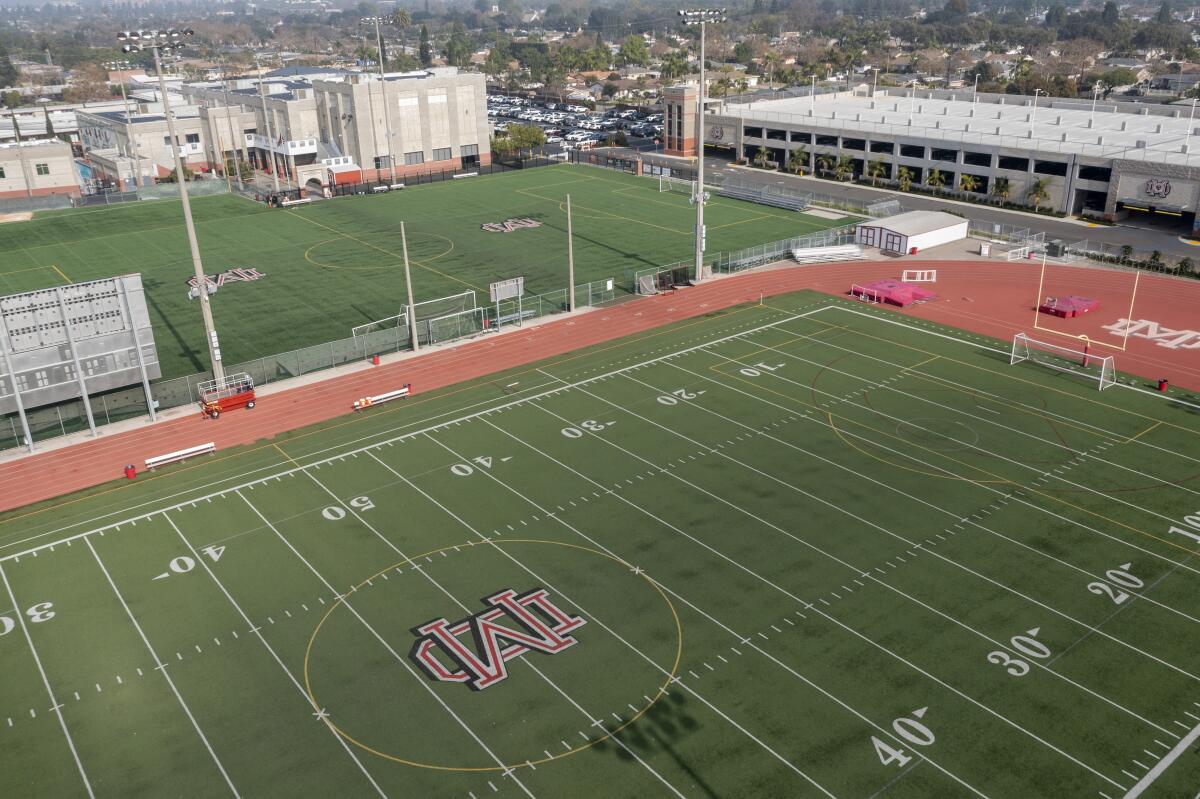
Generations of wealthy and powerful people have graduated from Mater Dei, which opened in 1950 as the first coeducational parochial school in Orange County.
Its vast network of influential supporters and alumni has mostly stayed quiet since the lawsuit broke last month.
Filed by the family of the injured player, the lawsuit alleges that his injuries stemmed from a Feb. 4 incidence of âBodies,â in which two players punch each other between the shoulders and the waist until one gives up. The larger of the two teens punched the other boy three times in the head, two videos reviewed by The Times showed.
Mater Dei tried to cover up the boyâs injuries, which also included a broken nose and slurred speech, by not calling paramedics and not contacting his family for 90 minutes, the lawsuit alleges. The Orange County Fire Authority did not dispatch an ambulance to the school on the day of the fight, according to agency records reviewed by The Times.
After the family reported the incident to police, a Mater Dei assistant principal ârefused to provide the police with requested information,â the complaint said.
Rollinson told the boyâs father that he âwould be a millionaire if he got paid $100 every time he heard about Bodies or other physical rituals,â but later told the police he had no knowledge of the game, according to the complaint.
The lawsuit also alleges that Rollinson told the boyâs father he was âin a bindâ regarding discipline for the second player, because his father was a coach. The coach isnât listed on the teamâs website, but he has coached several Mater Dei football players privately. He could not be reached for comment.
Rollinson did not respond to requests for comment.
A high school student gets assaulted. Their innocence is shattered; their lives, forever changed.
The schoolâs president, Father Walter Jenkins, has promised to investigate the February incident, and on Dec. 8 he announced that Mater Dei had hired an independent firm to review safety protocols at the school and in the athletic program.
Jenkins turned down a request for an interview. But in an email, he rebutted the allegation that the school or the athletic program has a culture of hazing.
âAs we have stated we do not believe there is any merit to the claims raised in this litigation and we look forward to the facts being presented in court,â he wrote.
The Orange County district attorney has declined to file charges, saying there was âno evidence of hazing or any other crime that we can prove beyond a reasonable doubt.â His challenger in next yearâs election has called for a child endangerment investigation into Rollinson.
The lawsuitâs accusations of a culture of hazing and a ârigorous, cutthroatâ attitude have resurfaced other reports of misconduct over the years. Those include dominant athletes who unexpectedly transferred to Mater Dei, a football player whose nose was broken during a blocking drill, and two football players who were accused in a civil lawsuit of beating up a basketball player at the behest of a classmate.
The school draws on a deep well of donors that includes local billionaires, prominent Catholics and some of Orange Countyâs most powerful families. Top donors have recently included realtors, attorneys and the family foundation of a local alcohol distributor. The schoolâs alumni include famous athletes and descendants of well-known Californians, including grandchildren of John Wayne and of Carl Karcher, founder of Carlâs Jr.
Family ties abound at Mater Dei. Students sometimes joke that they realize a classmateâs last name sounds familiar because itâs on a campus building. The two football players accused of assaulting a basketball player are represented by an attorney whose son plays on the football team.
Whenever Mater Dei scored at the state championship in Mission Viejo, supporters erupted in cheers and waved flags that said âMD Brotherhood.â But when the same fans were asked about the team, many grew quiet. Several parents said they felt they shouldnât answer any questions.
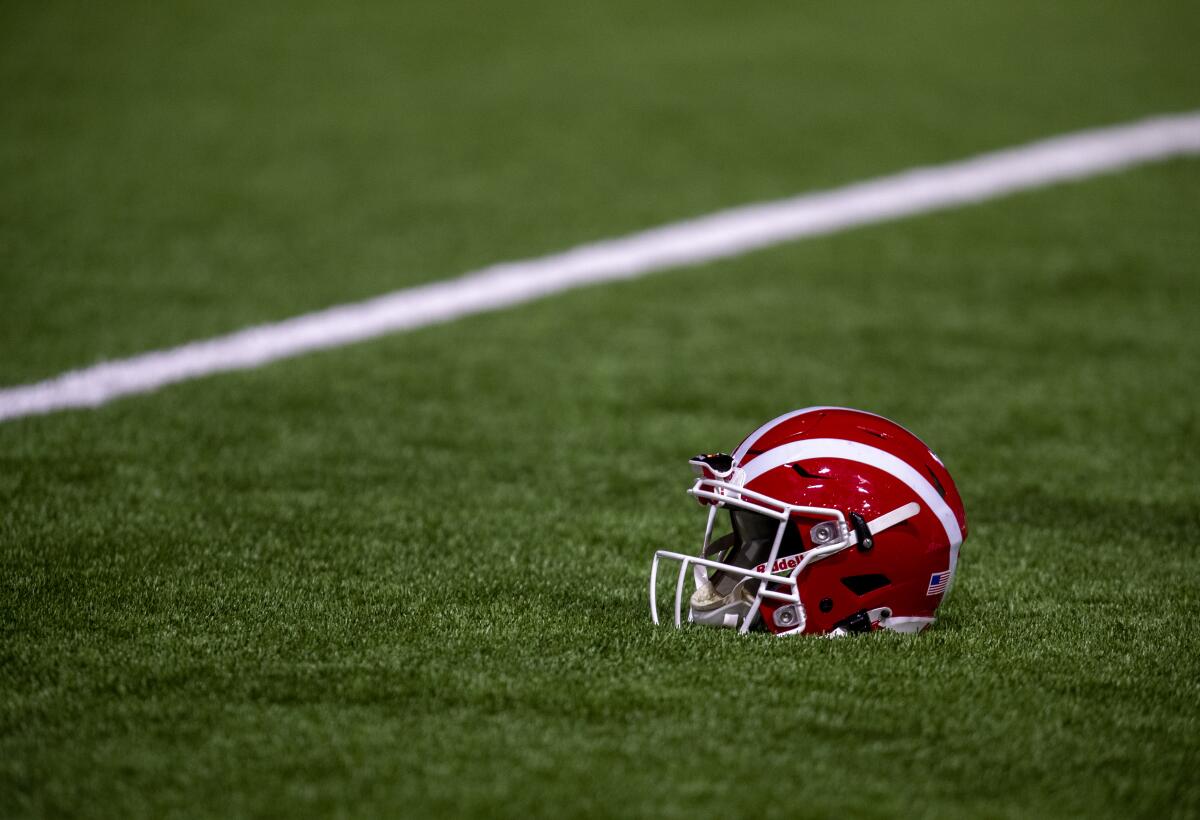
At halftime, one Mater Dei playerâs mother declined to speak about Rollinson or her sonâs experience on the team. She wrapped his red letterman jacket more tightly around her and said she wanted to âjust soak up every momentâ of his last high school football game.
When a team captain was asked in a postgame interview about the lawsuit, an adult standing next to him snapped: âDonât answer that. Weâre only talking about the game.â
But the rest of the state isnât.
Fans of the opposing team, Serra High School in San Mateo, compared Mater Dei to the Yankees or Manchester United, and not in a good way. Mater Dei fans accuse haters of being jealous of Rollinsonâs record as head coach: three state championships in the last five years, and just one losing season since 1989.
The week before the game, Duncan Stewart and his son, a senior who played safety for Serra, talked at the dinner table about the hazing allegations.
âWe were a little concerned about dirty play,â Stewart said. Many people who follow prep sports think Mater Dei gets a pass for behavior that might not be tolerated elsewhere, he said, believing that theyâre âgoing to get away with it because theyâre No. 1.â
Mater Dei and its football team have become a fundraising powerhouse, raking in millions of dollars from Orange Countyâs donor class and from a range of private companies, including a clean energy firm and a local rib joint. Mater Deiâs winning reputation is key to its fundraising prowess, said Daniel Durbin, director of the USC Institute of Sports, Media and Society.
âHaving the school identified as a school of winners, as a school of champions, brings donors back again and again,â he said. The opposite â that is, âdeclaring yourself elite, and having a mediocre programâ â would be deadly.
In 2019, the most recent year for which information is publicly available, the nonprofit Monarch Foundation brought in more than $11.1 million in donations. The foundation reported spending more than $3.5 million in 2019, all of which was disbursed to Mater Dei for expenses that included sports clothing and equipment, as well as âcoachesâ salaries and benefits, supplies, printing, etc.â
Separate from the foundation, Mater Dei reported raising about $4.9 million in donations in the 2019-20 school year.
As a religious institution affiliated with the Diocese of Orange, the school is not required by law to publicly report its donors, staff salaries or other spending that public institutions must disclose.
Itâs difficult to understand why Mater Dei coach Bruce Rollinson and principal Frances Clare still have jobs after video exposes hazing within team.
Rollinson is also a fixture at fundraisers and social events for Mater Dei and other Catholic causes. The football teamâs annual fundraiser is named for him. Heâs walked the runway several times in a menâs fashion show that supports a Catholic retreat center, once tearing open his Hawaiian shirt to reveal the Mater Dei logo on his T-shirt underneath.
Rollinson played football for Mater Dei and then for USC before returning to his high school alma mater as a history teacher in 1976. He has worked there ever since. He was hired as head coach in 1988 and tasked with reinvigorating a program that hadnât won a championship in years.
He reintroduced the schoolâs red helmets, emblazoned with three white stripes that represent the motto âpride, poise and courage.â Players earn the stripes when they make varsity, and sometimes refer to themselves as âthree-stripersâ or use the symbol \|/ on social media to show their brotherhood.
Parents of former players who have gone on to successful college and professional football careers describe Rollinson as a strong coach with a fiery personality. He expects dedication and hard work from his players and inspires intense loyalty.
Players remember Rollinsonâs pregame locker room speeches, delivered in his uniquely gruff voice, long after theyâve graduated. One former player compared his pep talks to the opening scene of âPatton.â
One of his favorite catchphrases, âYou provide the effort, God provides the outcome,â is written on the door to the varsity locker room.
Rollinsonâs influence on his players became clear to Steve Daniels, the father of quarterback JT Daniels, at the end of the first semester that his son played for Mater Dei. The family was just sitting down to Christmas dinner when their son sprang up to pull out the chair for his mother, a sign of respect he had never shown before.
âIf you spend 15 minutes with Rollo, youâll know you want your kid to be around a guy like that,â Steve Daniels said. âHeâs someone who always does things the right way.â
In 1989, Rollinson was charged with misdemeanor assault after Mater Deiâs head athletic trainer accused him of choking her in front of several students.
The trainer told police she had been reluctant to report the assault âbecause of Coach Rollinsonâs status with the school and communityâ and because she was âtrying to decide the best interest of Mater Dei,â according to a Santa Ana Police Department report reviewed by The Times. Though The Times reported the assault allegation at the time, the police report contains details that were not previously published.
The trainer told police that she had approached Rollinson to discuss a training room that had been left unlocked because she was concerned that equipment could be damaged if students werenât properly supervised. She said Rollinson said, âDonât fâing start with me, Iâve got enough fâing problems.â
The trainer alleged that Rollinson shoved her into a vending machine and started choking her. When she tried to cry out, he âplaced one hand over her mouth, muffling her scream,â the police report said. When he let her go a few minutes later, she said, she told him, âDonât ever touch me again.â
A vice principal at Mater Dei canceled a scheduled appointment for police to interview students, and told the police they would need a warrant to interview students, according to the police report. Instead, police visited students at home, where they corroborated the trainerâs story, the police report said.
An investigation by the school found that Rollinson had not physically attacked the trainer, according to a 1991 story in The Times. His misdemeanor assault trial ended in a hung jury, and Rollinson pleaded no contest to disturbing the peace, The Times reported. The district attorney did not retry the case.
âI look back now and it hurts,â Rollinson told The Times in 1991. âI mean, Iâm an intense person, but Iâm very sensitive. I felt bad for my mother because it didnât look good. In the end, after all the testimony, the jury didnât believe her.â
The hazing allegations havenât kept Mater Deiâs football program from charging forward. Two days after the championship game, alumni and donors gathered at the tony Old Ranch Country Club in Seal Beach for one of the football programâs largest fundraisers of the year.
The all-day Rollo Invitational, named for Rollinson, includes a putting contest, silent auction, cocktail reception and sit-down dinner. The event raises thousands of dollars annually. The donation necessary to be the title sponsor for the invitational is $25,000. A ticket for golf and the cocktail reception and dinner is $500.
Guests attending the dinner entered the sprawling property through a large arched doorway lined with garland and white Christmas lights. A sign nearby, written in all capital letters, read: âMedia strictly prohibited.â
More to Read
Sign up for Essential California
The most important California stories and recommendations in your inbox every morning.
You may occasionally receive promotional content from the Los Angeles Times.
